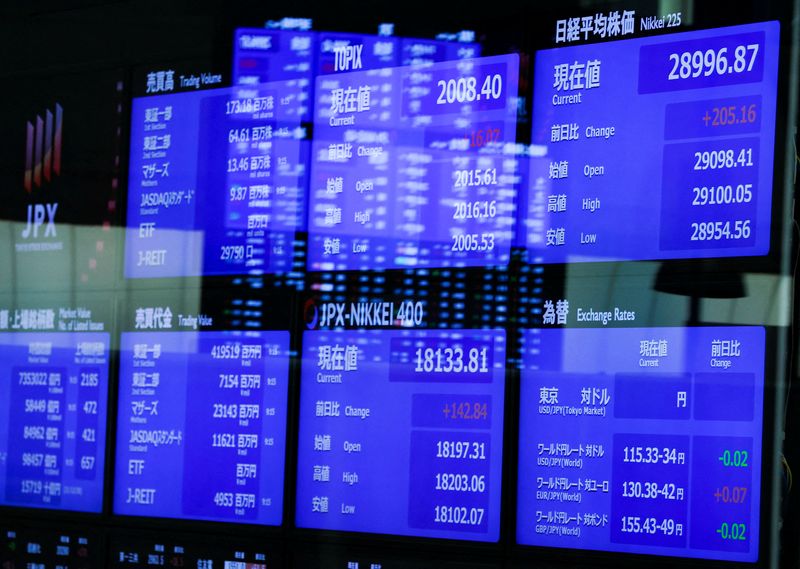By Alun John
HONG KONG (Reuters) – Asian stocks slipped on Wednesday following a mixed Wall Street session as higher U.S. Treasury yields weighed on global tech firms and pushed the dollar to a five-year high against Japan’s yen.
U.S. yields rose on Tuesday as bond investors geared up for interest rate hikes from the Federal Reserve by mid-year to curb stubbornly high inflation.[US/]
MSCI’s broadest index of Asia-Pacific shares outside Japan lost 0.8%, while Japan’s Nikkei was little changed.
U.S. stock futures also slipped with S&P 500 e-minis down 0.25% and Nasdaq e-minis losing 0.4%.
“From Asia’s perspective, it’s a slightly more risk-off tone because it’s one of those days where higher bond yields are a bad thing, as, even though they reflect a stronger U.S. backdrop, they tend to be supportive of the dollar rather than local currencies,” said Rob Carnell, head of Asia Pacific research at ING.
“But it’s pretty choppy, tomorrow we might get back to thinking the higher yields reflect a stronger global backdrop,” Carnell said.
He said overnight declines in the Nasdaq due to the higher yields weighed on Asian share markets given the greater significance of tech stocks in the region.
Hong Kong-listed tech stocks lost 3.7% in early trade while in Japan, Nintendo slipped 1% and in South Korea, Samsung (KS:005930) shed 2% ahead of its quarterly results.
U.S. shares were mixed on Tuesday with the tech-heavy Nasdaq losing 1.3%, though rising yields boosted banks and industrial names helped the Dow Jones Industrial Average to a record closing high and the S&P 500 to touch an all-time intraday high. [.N]
U.S. five-year notes, which reflect rate hike expectations, soared to their highest since February 2020, after U.S. two-year note yields hit their strongest level since March 2020 on Monday.
Benchmark U.S. 10-year treasury yields touched a six-week high on Tuesday and were last at 1.657%. [US/]
Minutes from the Fed’s December meeting, due at 1900 GMT, could underscore U.S. policymakers’ newfound sensitivity to inflation and their readiness to tighten policy.
“The market is now speculating that a March rate hike is possible when the Fed stops purchasing assets, therefore yields are rising,” said Edison Pun, senior market analyst at Saxo markets in Hong Kong.
He said he thought declines in tech stocks would be short-lived, while rising yields would help banking stocks.
HSBC’s Hong Kong-listed shares rose 2.3% on Wednesday, though Chinese bad debt manager Huarong lost 40% on resuming trading after a suspension.
In currency markets, the yen was at 116.7 per dollar having dropped to as low as 116.34 overnight, its lowest since March 2017.
With the Bank of Japan widely expected to be late if not last in the queue hike rates, the gap between U.S. and Japanese yields are rising, hurting the yen. [FRX/]
The euro was also on the back foot with the European Central Bank also likely to be slow to raise rates. As a result, the dollar index which measures the greenback against six peers was at 96.272, the stronger end of its recent range.
Oil prices drifted down on Wednesday, giving up some of the previous session’s gains. Brent crude futures fell 0.3%, to $79.73 a barrel after hitting a high of $80.26, while U.S. West Texas Intermediate (WTI) crude futures lost 0.3%, to $76.75 a barrel.[O/R]
Spot gold was at $1,814 an ounce, steady on the day and at the upper end of its recent range.

Source: Investing.com /Reuters

